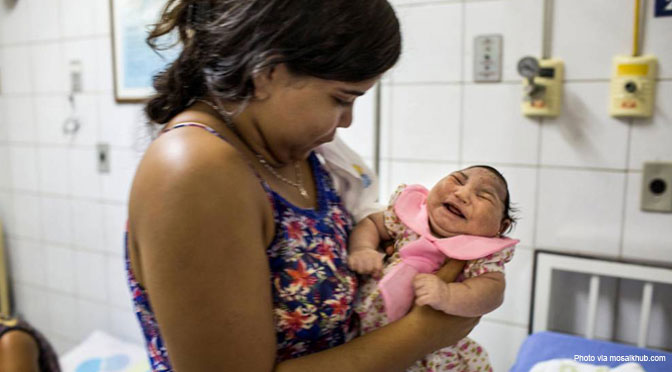According to ABC News, a new report released by the Centers for Disease Control states that “[o]ne in 10 pregnant women with confirmed Zika virus infections had an infant or fetus who showed signs of birth defects.”
“… [O]f 250 pregnant women who were tested and found positive for Zika infection,” writes ABC News, “24 had infants or fetuses with birth defects.” 972 women who reportedly “had evidence of possible Zika infection” but were not tested for the virus gave birth. Among those, five percent of babies had birth defects, with most involving “brain anomalies.”
Spectrum News in Austin, Texas, says the study also showed that “the risk of birth defects is greater when a woman is infected during the first trimester of a pregnancy — 15 percent of women who contracted Zika in trimester 1 had babies with birth defects.”
One unexplained finding from the study was that “some of the women [with Zika] were infected by mosquitoes here in the U.S. but all 51 babies with birth defects were traced to infections that occurred outside of the U.S. in one of 16 countries in Latin America and the Caribbean, including Puerto Rico.”
Birth defects ranged from “microcephaly, to neural tube defects and eye malformations.”
Microcephaly, in which a child is born with a much smaller head than what is considered to be normal, is believed to be one birth defect that can be caused by the Zika virus. However, in 2016, Live Action News’ Rebecca Downs reported that a study from the New England Journal of Medicine “cast[] doubts on the connection between microcephaly and the Zika virus.”
Many pregnant women who find that they may have Zika abort their children for this reason. Spectrum News writes that in Texas, “at the end of March, 181 pregnant women had shown signs of a possible Zika infection — 67 of those babies were born.” That means nearly two-thirds of those children were not born. How many might have been lost to abortion?
Since the fear of Zika began to spread, some people born with microcephaly, as well as their families, have spoken out against the idea that abortion is a ‘solution’ to the problem of Zika — people like Brazilian journalist Ana Carolina Caceres, the Hartley family and the De Clercq family.








